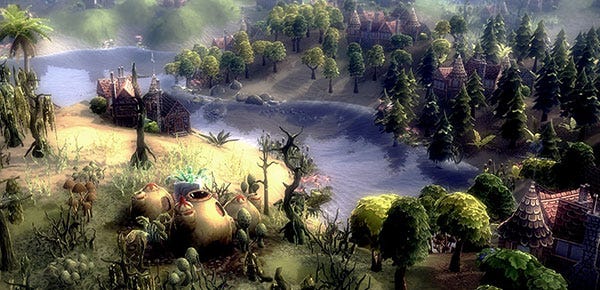Isle of Alright: Masters of the Broken World
The omni-strategy game?
"Fantasy non-linear turn-based strategy" is the official description. I can't think of a better way to put it, but it hardly begins to describe the scope and scale of Snowberry's vast game of space-island conquest.
You may recognise Masters of the Broken World from John pretending he isn't afraid of strategy games in this post. Since then, I've seen this remake of what was formerly a one-man project myself, and have if not total then at least partial understanding of what's going on in the deep'n'clever build or bash opus.
You're cast in the role of an immortal demigod, competing with assorted fantasy ruler types for control of a kingdom scattered across the titular and literally broken world. You can achieve this via brutalism or canniness, and an in-game karma system means you're going to see different results dependant on how you go about your land-seizing business. Killing everyone in a province is obviously one way to grab control, but a little conversation could go a long way. Maybe they'd sign up if you found 'em some food. Or maybe it's a residence of villanous hobgoblins who'll join your ranks if you'd only go and inflict some sort of immeasurable horror on a neighbouring hobbit settlement.
There'll be seven different endings, depending on what you've been up to. As well as actions, this includes who you hang about with. Recruit a bunch of hobbits and you'll stay firmly in the nice guy camp. Lean towards Orcs and you'll find yourself painted in a rather different light. Darker units are more powerful and cheap, especially in the early stages of the game, but hang fire through hard times and stick to the light and you'll find you eventualy have access to the game's most effective soldiers, such as paladins and Elven commanders.
Fascinatingly, there won't be some manner of brazen meter or guage telling you how far you've wandered into darkness - instead you need to ascertain it yourself, based on how your holdings' appearances start to change. I've written down something about rainbows appearing around ponies here, but I'm a bit worried I was just delirious at that point. Anyway!
As well as the good/bad choice, the very act of expansion has a rather abstract pair of options. Rather than expanding externally - seeking out and gaining new provices by actions fair or foul - you can expand internally. Which sounds incredibly painful, but actually refers to exploring within and developing what you already own. You might turn up artifacts or secret places, or simply go towards maximising an area's output and income. The devs reckoned that in some cases it's better to concentrate on just a few provinces instead of trying to grab everything. Especially as you need to have one of your few heroes inside a province to explore it, instead of out and about fighting, so there'll be plenty of tough strategic calls to be made in that regard.
Still: you will need to be grabbing hold of new land somehow, as conquering a world is the only way to control the special technology it holds. Lose that world to someone else and there'll be the only ones with its technology. Your goal on each shard-world is not to conquer every promise, but simply to seize the enemy capital. Similarly, you have only one capital city yourself, which can be upgraded and expanded in assorted ways to your economic or military benefit.
The game's split between a Civ/Total War-esque meta-map, on which you might be waging wars on multiple fronts (so a diplomatic approach of sorts will be required to keep this manageable) and turn-based battles in the vein of Heroes of Might and Magic but with a greater emphasis on stuff like terrain type and stamina. You'll need to think tactically to win, whether it's hiding your healers in forests and putting archers on hills or just resisting the urge to spam the enemy with your stronger units, else you'll wear them out.
Heroes are in the mix too - in fact, you can't move an army unless one is attached. You can only have up to four at a time, and they're incredibly expensive as well as powerful. They're not all combat-orientated either, so you'll be picking different types dependent on your intentions - for instance, the Rogue excels at diplomacy and exploration, while the Commander can't look after himself in a fight but does enable you to have a bigger army and range of support powers. On the battlefield, these guys are incredibly handy, but all too mortal. Come their death, you'll have the option to expensively resurrect them later or recruit someone new.
I fear I have only fractional understanding of Masters of the Broken World, and its many, many decisions. It appears to be a hugely elaborate strategy game with a headful of ideas and a heartful of confidence, and will likely only become entirely comphrensible after extensive play. That's exactly why I'm intruiged by it - something to lose myself in, to teach myself and with a freeform structure that isn't trying to send me anywhere specific or cleave too closely to genre convention. It has elements of grand strategy titles such as Hearts of Iron, but the fantastical wildness and variance that a flighty-minded soul such as I requires. More on this soon, I think. Meantime, here's Gametrailers' recording of a Gamescom demo session, which should cast some more light on what's going on in MOTBW:
Masters of the Broken World will hopefully launch at some point next year, but the devs say it's ready when it's ready.













